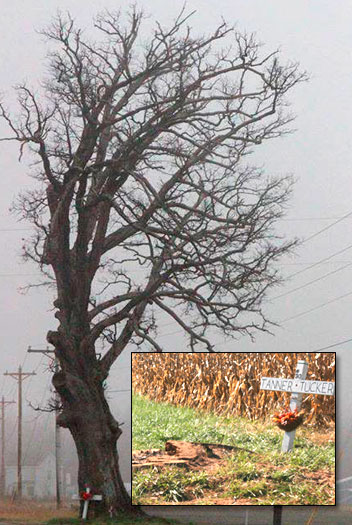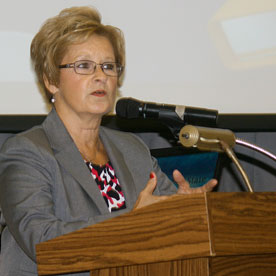No more Milan landmark
Good, bad memories come down with old oak tree

FACEBOOK PHOTO; INSET BY MARY MATTINGLY
This is the old oak tree before it was taken down Oct. 8. The Tanner Tucker cross was put up by his father at the stump, but it has since been removed.
Mary Mattingly
EDITOR
mmattingly@ripleynews.com
A landmark that gave many people warm memories, but for others was a reminder of a tragic loss, in Milan was taken down Tuesday, Oct. 8.
The old oak tree on SR 101 near Stumpke’s Corner died and became a safety and liability for Southeastern Indiana REMC. A tree crew was sent to the corner Tuesday to bring down the tree.
Barry Lauber, director of office services, SE REMC, said their tree foreman investigated after some calls from residents were made about concerns that the tree would fall and harm someone. If it was still alive, it would be a different story, Lauber commented. “It was rotten and posed a danger to the public and our power lines,” he said. Although it was on a state right of way, REMC made the decision to remove it because of the safety issue. Lauber said it was so rotten it fell to pieces last Tuesday, Oct. 8, when they sawed it down. Nearby property owner Earl Haase was offered some of the wood to save them the cost of hauling the wood.
Haase commented he grew up with the tree. “I wanted it to stay up when it was living, but once it died, it needed to come down. “
Trace Tucker of Versailles has wanted the tree down for three years. He lost his 17-year-old son Tanner, when his vehicle crashed into the oak tree in 2010. Tucker said no one is sure why his son lost control that night. The toxicology report indicated there was no alcohol in the 17-year-old. Police said he may have swerved to avoid a deer in the road, or perhaps he fell asleep, “but had the tree not been there he would have ended up in a soybean field,” Tucker said.
The family had sent a letter to Gov. Daniels at the time to remove the tree but did not get much response. “ I felt like our loss was insignificant to Milan’s landmark.” Tucker said. Tucker, who has three other children, said he knows saving the tree won’t bring back his son. “But it could save someone else.” He avoids the area, even takes another route when driving a South Ripley bus to events to nearby schools. The cross was removed this week, but will be put back up again by the Tucker family. Tucker added, “I am not glad the tree was taken down.”
Cindy Richmond grew up in Milan and will miss the icon as she calls it. “It’s how you give directions to people,” she said. Some dispute that the tree caused the accidents. It just happened to be there.
History
No one is sure of the oak tree’s age. The tree rings couldn’t be counted because tree had deteriorated so much. Milan native Walter Jordan thinks it could be 200 years old. He remembers it as a young lad. “I’m 93 and I remember it was a big tree when I was a little kid….I went under that tree time and time again. It was always too big to climb.” He fondly recalls many picnics held there.
Former assistant postmaster Marie Gault, 92, Ripley Crossing, didn’t know the tree was gone. “It was a landmark, and they took it down?” But she said it did cause problems for some, citing some fatal accidents. “They always had strawberries and peaches there.”
Several wonder what will happen to The Peach Man, as the Milan natives call the farmer who has been coming to the area for more than four decades to sell peaches under the oak tree. Last year, he brought a tent canopy because there were no leaves on the tree to provide shade.
Milan’s David Raynor, 62, is sad to see it go. “The old oak tree has seen a lot over the years,” he said. He talked about the ’54 champs who rolled past it in celebration, the stolen kisses, and the new babies driven by coming home from the Batesville hospital. “It’s a place to remember your childhood” he wrote on Facebook. “It’s an important part of nature.” However, he said he understands the safety reason for chopping it down since it rotted and could easily fall.
No one is sure why the tree died, but Raynor talked to some tree experts and they said the drought a couple of summers ago likely killed the tree. It went months without water, he said. Adjacent property owner Haase noted it died fairly quickly. Another thing about the town icon, is it was the only tree in three-fourths mile of the rural area. Someone told Raynor a tree was often planted in open acreage by farmers to draw lightning away from the field. Raynor knows the tree was struck many times by lightning. Besides the memories, good or bad, all that is left today, is a stump.
At South Ripley
Secretary of state gives advice on financing
Mary Mattingly
EDITOR
mmattingly@ripleynews.com
Forty percent of Americans live beyond their means, and 50 percent live paycheck to paycheck. That’s what Indiana Secretary of State Connie Lawson told South Ripley junior and senior students last Thursday, Oct. 10.
The secretary of state was trying to reach the students before they enter the job market or go to college, to consider budgeting, credit, investing and even investment fraud. “It’s part of financial literacy,” she told the students.
“What is financial literacy? It is the ability to use knowledge and skills to manage financial resources effectively for a lifetime of financial well-being,” she said. It’s about spending less than you bring in, and planning for the long and short term.
PHOTO BY MARY MATTINGLY
Secretary of State Connie Lawson speaks at South Ripley High School about financial literacy.
South Ripley students get some of those lessons sophomore year during the semester course on college and careers, and as part of a senior economic class and business math. But budgeting and credit often can’t be stressed enough, even to adults. South Ripley senior Karen Miller said at this point in her life, her biggest financial concern “is paying off a student loan and not getting enough of a loan.” She’s worried the interest rate will rise. A group of senior girls said prior to the session they had talked about balancing a checkbook with parents, and knew about debit card use. SR counselor Anne Poling said she wants to make sure students leaving school don’t get in trouble with credit card debt. Students are often targeted by credit card companies once they graduate.
Budgeting fails when you don’t prioritize expenses, or you don’t plan for unexpected events. To create a budget, she said, to consider those things, and weekly, monthly, semi-annual expenses, such as property taxes or car insurance. There are essentials, necessities and discretionary income where you can “maybe cut down on groceries or personal items,” to make ends meet, she advised. She also talked about credit. “Credit is a powerful tool that gives you access to student loans, credit cards, auto loans. It can be a very good thing and a very bad thing.” Bad credit could hurt in getting a job, she said. She warned students of getting in over their head with credit cards. Citing a national statistics,“Twenty-one percent of graduates have $7,000 in credit card debt” she then showed a video of a recent graduate’s struggle with paying off a $2000 credit card bill. It will take her eight years, and is like a monthly car payment. Lawson did inform the students of a free credit report, at 1-877-322-8228 available once a year.
Investing “allows you to put your money to work for you.” Consider though there are no guarantees. Look at your goals, and your own risk tolerance, she added. Bringing home the value of compound interest, she asked, “Would you rather have a million dollars right now or a penny doubled everyday for 30 days?” She did the math, and showed how the penny doubled actually earns more money with compound interest.
There are also many investment frauds out there, such as Ponzi schemes. Indiana has put several people behind bars because of such illegal activity. A Ponzi scheme, named after Charles Ponzi who was convicted in court for fraud, builds a pyramid of investors, using their cash outlay to pay the other investors. It falls apart when they lose investors. Lawson asked the students how to avoid being scammed online or through credit card fraud. One student replied to “investigate and meet the person.” Senior Billie Jo Halcomb said she learned from the presentation, about Ponzi schemes and how they work. Lawson also gave numbers to report complaints, 1-800 223-8791 or online at indianainvestmentwatch.com.




